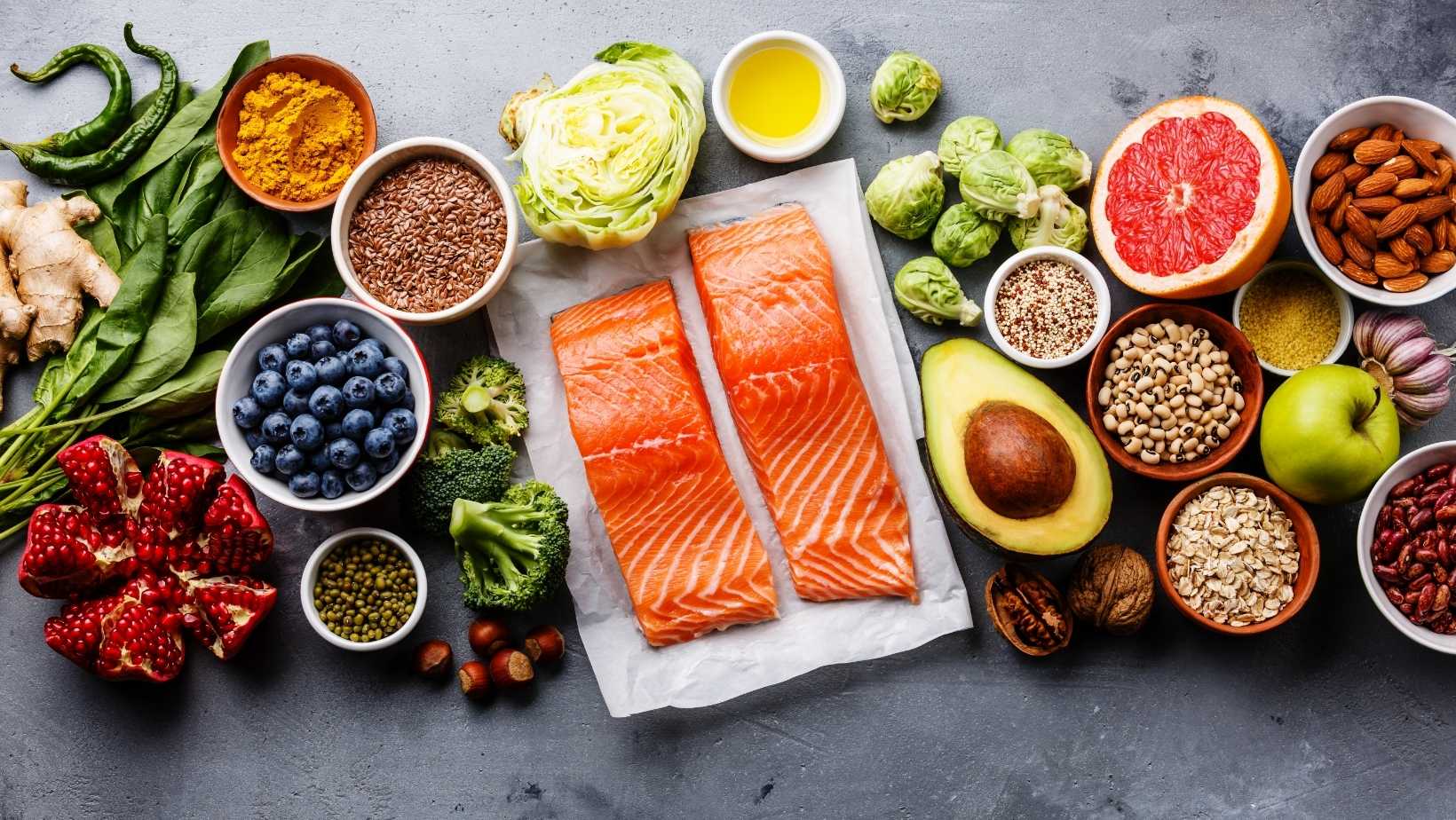When we are on edge, we often reach for sweets. But unfortunately, the chocolate bar you see in an advert is not the right thing for you at such a moment. But which foods are suitable if you want to do something good for your nerves? Here you can find out which foods are good for your nerves.
There is a gift waiting for you at the end of the article.
It’s worth reading on!
You are what you eat!
Our nervous system - and our brain too - is a fascinating thing that in some ways can be beyond our imagination. Would you like an example? If you were to lay all the nerve fibers of the adult body together, they would be between 580,000 and 780,000 kilometers long - 145 times around the earth or the distance to the moon and back. [1]
As a control center with its own network throughout the body, the brain and nerves are responsible, among other things, for ensuring that the lungs breathe, the heart beats, that we move, that we can think and feel. So it's no wonder that the brain and nerves should be kept healthy, functional and happy with good nutrients.
Because certain foods not only maintain this current state of health, but can under certain circumstances even improve our concentration, memory and mental performance, we should take a closer look at them.
What is nerve food?
The term "brain food" is not a medical term, but is often used in everyday life. It is actually self-explanatory: it usually refers to foods and nutrients that have a positive effect on our brain and also on our nerves. The best prerequisite for this is, of course, a healthy, balanced diet that can be maintained over the long term.
If we lack the nutrients that our body needs, we may react in an unbalanced manner, become easily irritable, are constantly exhausted or show other symptoms of deficiency. This is where vitamins, minerals and trace elements come into play. They are all important for the brain and nerves and counteract the deficiencies mentioned.
And because it's not about the quick availability of sugar, but about a long-term basis of healthy nutrients, there's no reason to quickly reach for a chocolate bar.

Which nutrients our nerves need
Here we have a summary for you that shows you all the important nutrients and their function in relation to the brain and nerves.
Proteins
Proteins consisting of amino acids, for example, provide structure and support to cells as signaling molecules. They are also involved in various biochemical reactions.
Vitamin B1
Vitamin B1 is important for the energy supply of nerve cells and the production of nucleic and fatty acids. [2]Vitamin B2
Riboflavin protects the myelin layer of cells and protects them from oxidative stress. [3]Vitamin B3 (niacin)
Vitamin B3 is important for energy metabolism and for the repair of damaged nerve cells. [4]
Vitamin B5 (pantothenic acid)
Vitamin B5 is involved in fat and protein metabolism and is needed for the production of energy in the cells. [5]
Vitamin B6
Vitamin B6 is needed to produce various neurotransmitters, such as adrenaline, dopamine, serotonin and gamma-aminobutyric acid - GABA for short. [6]
Vitamin B7 (biotin)
Important for protein synthesis and energy production in cells. [7]
Vitamin B12
Vitamin B12 is important for the regeneration of nerve fibers and the functioning of the nervous system. [8]
Because B vitamins are so important for the nerves, they are also known as “nerve vitamins.” In the article about B vitamins , you will learn what else this group of vitamins can do.
Vitamin C
Vitamin C protects nerve cells from oxidative stress and thus promotes their regeneration. [9]
Vitamin E
Similar to vitamin C, vitamin E protects nerve cells from oxidative damage and inhibits nerve pain. [10]
Minerals
Minerals such as iron, calcium , magnesium , copper , potassium , manganese, zinc , iodine and selenium support nerve functions in many ways. These include, for example, protection against oxidative stress, maintaining a healthy psyche, signal transmission between nerve cells and reducing fatigue.Omega-3 fatty acids
As a component of nerve cell membranes, omega-3 fatty acids have important structural functions and promote the connection and formation of new nerve cells. [11]

These are nerve-strengthening foods
After taking a look at the different substances that are good for the brain and nerves, the question remains: what to eat?
We have listed nine foods for you that are rich in these nutrients.
1. Fatty fish
You might not immediately associate fatty fish with comfort food. But sardines, salmon and mackerel in particular are very rich in valuable omega-3 fatty acids.
A study published in the Journal of Biomedical Science shows that our brain depends on omega-3 fatty acids to build cells and that they are partly responsible for memory and learning. [12]
2. Coffee
Coffee? Good for the nerves? In fact, coffee contains not only caffeine but also antioxidants - both substances support the brain.
For example, a 2008 study showed that caffeine could, among other things, boost the production of neurotransmitters such as serotonin. [13]
Another study, published in the journal Practical Neurology , found a link between long-term coffee consumption and a reduced risk of neurological diseases such as Parkinson's and Alzheimer's. [14]
3. Blueberries
These fruits are a source of anthocyanins, a group of plant substances with anti-inflammatory and antioxidant effects, and according to a 2014 study, have a positive effect on neurodegenerative diseases. [15]
An animal study published in the Journal of Agricultural and Food Chemistry even linked blueberry consumption to improved memory and a delay in short-term memory loss. [16]
4. Broccoli
When it comes to healthy eating, broccoli is always included. No wonder - it is rich in many good nutrients, such as vitamin K , of which it provides more than 100 percent of the recommended daily allowance in a portion of around 91 grams.
Vitamin K - a fat-soluble vitamin - is important for the formation of so-called sphingolipids. These are important components of the cell membrane, of course also in the brain. [17]
5. Dark chocolate
This is the closest you'll get to chocolate as comfort food. Unlike their overly sweet cousins on the supermarket shelf, cocoa powder and dark chocolate are packed with flavonoids, antioxidants and caffeine. [18]
A study published in the scientific journal Neuroscience & Biobehavioral Reviews suggests that the flavonoids found in dark chocolate may improve memory and also help slow age-related mental decline. [19]
6. Nuts
You're probably familiar with trail mix and its reputation as comfort food. This is due in no small part to the nuts that are present in abundance in every portion.
A review, first published in The American Journal of Clinical Nutrition , seems to confirm just that: nuts are said to improve our cognitive abilities and even help prevent neurodegenerative diseases. [20]
Another study from 2014 found that women who ate nuts regularly over a long period of time - several years - had sharper memories compared to those who did not eat nuts. [21]
7. Oranges
Eating adequate amounts of foods rich in vitamin C may protect against age-related mental decline and Alzheimer's disease, according to a 2014 review article. [22]
Vitamin C is a powerful antioxidant that helps fight off free radicals that can damage brain cells. Additionally, vitamin C supports brain health as we age. [23]
8. Eggs
Eggs are a good source of nutrients for… pretty much everything. And that's no wonder, considering what they are and what they actually do.
In addition to vitamins such as vitamin B6 and vitamin B12, they also contain large amounts of folate and choline. Choline is an important micronutrient that the body uses to create acetylcholine, which is a neurotransmitter that helps regulate moods and memory. [24]
A study published in the journal Nutrients links deficiency of two types of B vitamins - folic acid and B12 - to depressive disorders. [25]
9. Green tea
Like coffee, the caffeine in green tea promotes brain function. In fact, it has been found to improve performance, memory, and concentration. [26]
But green tea also has other components that make it a healthy drink for the nerves and brain. One of them is L-theanine, an amino acid that can cross the blood-brain barrier and increases the activity of the neurotransmitter GABA, which helps reduce anxiety and makes you feel more relaxed. [27]

Conclusion: Healthy nutrition creates strong nerves
There are a number of foods that can help keep your nerves and brain healthy.
Some of the foods on this list, such as fruits, vegetables, tea and coffee, contain antioxidants that can protect the brain from damage.
Others, like nuts and eggs, contain nutrients that support memory and brain development.
You can support your nerve and brain health, as well as boost your attention, memory and mood, by strategically incorporating these foods into your diet.
As promised, you will find a 10% voucher for the following products:
Vitamin B Complex , Vitamin B Complex Forte , Vitamin C , Calcium , Potassium ,Magnesium , Essential 4-daily , Omega-3 , Iodine from organic kelp , Zinc & Copper , Zinc drops , Selenium drops , Selenium tablets
Simply copy the voucher code NERVEN+V10 and enter it at checkout.
To the shop
[1] https://www.spektrum.de/quiz/welche-laenge-wuerden-die-nervenfibrillen-eines-erwachsenen-erreichen-wuerde-man-sie-alle-aneinander-kn/583154
[2] https://pubmed.ncbi.nlm.nih.gov/939994/
[3] https://www.lebensmittelverband.de/de/lebensmittel/futterrgaenzmittel/futterrgaenzung-naehrstoffe/nem-vitamin-b2
[4] https://www.neurologen-und-psychiater-im-netz.org/neurologie/news-archiv/melde/article/parkinson-vitamin-b3-hat-positive-effekt-auf-geschaedigte-nervenzellen/
[5] https://www.deutsche-apotheker-zeitung.de/daz-az/2008/daz-28-2008/pantothensaeure-bring-energie
[6] https://pubmed.ncbi.nlm.nih.gov/29685187/
[7] https://www.ncbi.nlm.nih.gov/pmc/articles/PMC1168035/
[8] https://landeszentrum-bw.de/,Lde/Startseite/wissen/Vitamin+B12
[9] https://www.frontiersin.org/articles/10.3389/fncel.2019.00108/full
[10] https://www.nervenschrei-ratgeber.de/tipps/nervenschrei-durch-vitaminlack-infos-treatment/
[11] https://www.der-arzneimittelbrief.de/de/artikel.aspx?SN=6638
[12] https://jbiomedsci.biomedcentral.com/articles/10.1186/s12929-016-0241-8
[13] https://onlinelibrary.wiley.com/doi/abs/10.1111/j.1467-3010.2007.00665.x
[14] https://pn.bmj.com/content/16/2/89
[15] https://www.ncbi.nlm.nih.gov/pmc/articles/PMC4192974/
[16] https://pubs.acs.org/doi/10.1021/jf9029332
[17] https://academic.oup.com/advances/article/3/2/204/4557944?searchresult=1
[18] https://core.ac.uk/download/11592331.pdf
[19] https://pubmed.ncbi.nlm.nih.gov/23810791/
[20] https://academic.oup.com/ajcn/article/100/suppl_1/347S/4576446?searchresult=1
[21] https://www.ncbi.nlm.nih.gov/pmc/articles/PMC4105147/
[22] https://www.ncbi.nlm.nih.gov/pmc/articles/PMC3727637/
[23] https://pubmed.ncbi.nlm.nih.gov/25244370/
[24] https://www.spektrum.de/lexikon/neuroscience/acetylcholine/69
[25] https://www.mdpi.com/2072-6643/8/2/68
[26] https://pubmed.ncbi.nlm.nih.gov/28056735/
[27] https://pubmed.ncbi.nlm.nih.gov/17182482/

















